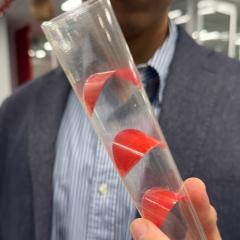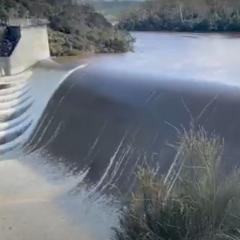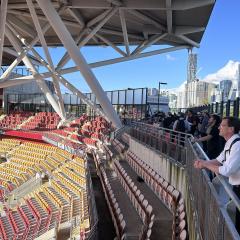Undergraduate engineering theses submissions
Thesis topic selection, assessment and submission.
Details for thesis project selection, assessment and submission can be found on your School's website:
- School of Chemical Engineering
- School of Civil Engineering
- School of Information Technology and Electrical Engineering
- School of Mechanical and Mining Engineering
Students must refer to the relevant Course Profile for information about undertaking and submitting their thesis. Students enrolled in their thesis coures should login to https://www.sinet.uq.edu.au to access the complete course profile.

EAIT Project Database
EAIT Project Database .
Introduction
- Australian theses
- International theses
- Further help
Reusing content from this guide

Attribute our work under a Creative Commons Attribution-NonCommercial 4.0 International License.

You can discover:
- what has been written on a topic
- what others are doing in your field
- what methodologies are being used.
Find out how to search for theses from:
- International.
Photo by Aaron Burden on Unsplash
- Next: UQ theses >>
- Last Updated: Sep 9, 2024 9:34 AM
- URL: https://guides.library.uq.edu.au/how-to-find/theses
Empowering students to create their future and our future society
The School of Civil Engineering is renowned for teaching and research in water, environmental, geotechnical, structural, fire, and transportation engineering. Our purpose is to create leaders to deliver sustainable engineered and natural environments to protect people, places and heritage.
Latest News

New origami-inspired system turns flat-pack tubes into strong building materials

Observations of the Trevallyn Dam Spillway, Launceston


Students Gear Up for Brisbane 2032 Olympics with Hands-On Experience at Suncorp Stadium
General enquiries.
Email: [email protected] Phone: +61 7 3365 4998
Student enquiries
Email: [email protected] Phone: +61 7 3365 3619
Future student enquiries
Enquire online
Student resources
- Academic advice
- Engineering student resources
- EAIT Faculty website
Staff resources
- School Intranet
- Faculty Intranet
- UQ Current Staff
School Office
Room 555 Level 5 Advanced Engineering Building (49) The University of Queensland Queensland 4072 Australia ( Map )
Keep in touch
- Join us on LinkedIn
- Like us on Facebook

IMAGES
COMMENTS
Civil Engineering library guide, University of Queensland ... How to find a thesis: Most theses are available online. You can search for UQ theses in: ... UQ eSpace. UQ eSpace is the University of Queensland's institutional repository containing the research output of UQ researchers including UQ Research Higher Degree Theses and some Masters ...
UQ Library holds Higher Degree by Research theses and some Honours and Coursework master's theses. Print or online UQ theses. Go to the Advanced search of Library Search; Enter your search keywords in the search box; Use the drop-down option to choose UQ School, Centre or Institute and add the name of the School; Under Content type select Theses; Click Search to see the results
I want to apply for permission to enrol in a Research Thesis (RT) program under the code CIVL[xxxx]. My full name is: [xxxx] My student number is: [xxxx] Kind regards, [xxxx] Send your email to [email protected] Permission can only be granted after grades have been released in the current semester. 3. Project selection
School of Information Technology and Electrical Engineering; School of Mechanical and Mining Engineering; Students must refer to the relevant Course Profile for information about undertaking and submitting their thesis. Students enrolled in their thesis coures should login to https://www.sinet.uq.edu.au to access the complete course profile.
Theses can inform your research.. You can discover: what has been written on a topic; what others are doing in your field; what methodologies are being used. Find out how to search for theses from:. UQ
The details for the Civil HLO (HDR Liaison Officer) team can be found at https://graduate-school.uq.edu.au/contacts. All HDR correspondence from applicants, current candidates, and academics is through [email protected]. For assistance on academic matters, please contact either the DHDR or the student representative.
Civil. Tiankai Song. Effect of compartment configuration on the self-extinction of cross-laminated timber. Juan Hidalgo. Civil. Ming Chen. Development of Hencky bar chain model for vibration analysis of arches. CM Wang. Civil Fire modes in open-plan compartment fires: effect of combustible ceiling. Juan Hidalgo. Civil. Haolin Liao. Engineering ...
School of Civil Engineering. Menu. Home ; About Show About sub-navigation. Facilities ... Research thesis projects (commenced in Semester 1, 2019) Home. Current Students. Postgraduate coursework. ... Modelling future mobility choices in Queensland. Carlo Prato. Transport. Deborah Koh. Excavation Boundary in soft rock conditions: Brunei ...
CRICOS Provider Number 00025B UQ School of Civil Engineering. [email protected]. civil.uq.edu.au/study SEM Y EAR 1 Sem 1 . Feb ; ENGG1100 Professional Engineering ENGG1700 ... Research Thesis (Part B) or Adv Civil Elective Adv Civil Elective Adv Civil Elective Sem 8 July CIVL4514 or CIVL4516 Capstone Design (Built or Natural ...
The School of Civil Engineering is renowned for teaching and research in water, environmental, geotechnical, structural, fire, and transportation engineering. Our purpose is to create leaders to deliver sustainable engineered and natural environments to protect people, places and heritage.